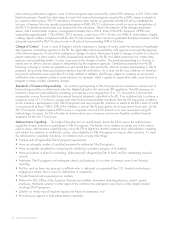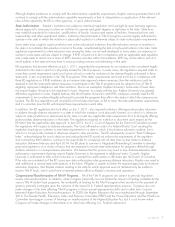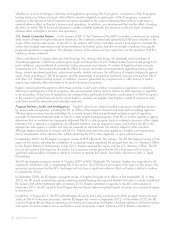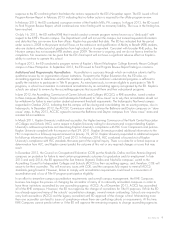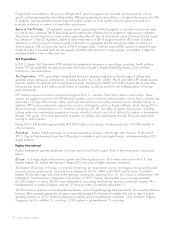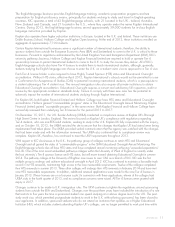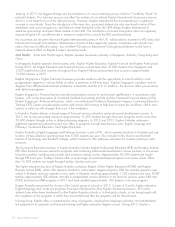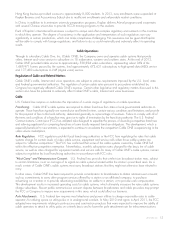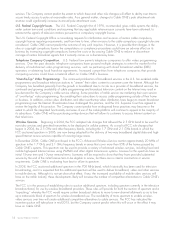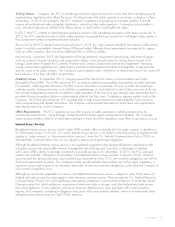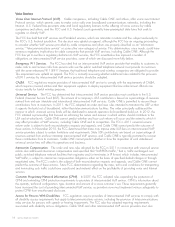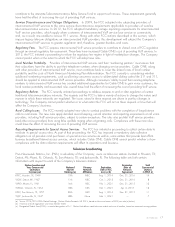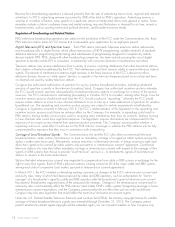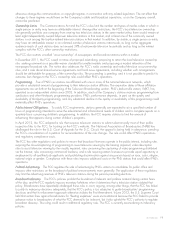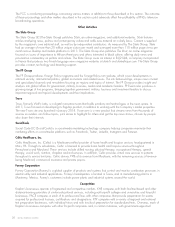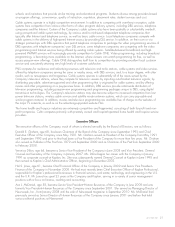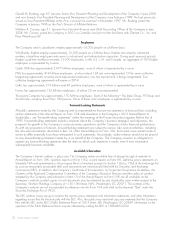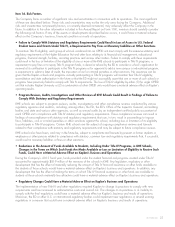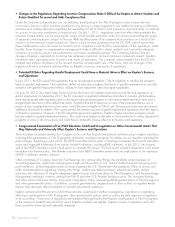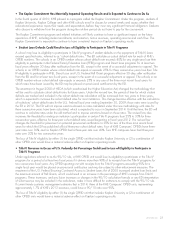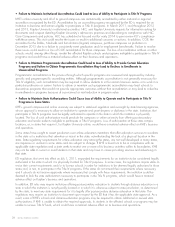Washington Post 2013 Annual Report Download - page 34
Download and view the complete annual report
Please find page 34 of the 2013 Washington Post annual report below. You can navigate through the pages in the report by either clicking on the pages listed below, or by using the keyword search tool below to find specific information within the annual report.Voice Services
Voice Over Internet Protocol (VoIP). Cable companies, including Cable ONE and others, offer voice over Internet
Protocol service, which permits users to make voice calls over broadband communications networks, including the
Internet. U.S. Federal law preempts state and local regulatory barriers to the offering of voice service by cable
companies and others, and the FCC and U.S. Federal courts generally have preempted state laws that seek to
regulate or classify VoIP.
The FCC has held that VoIP services are IP-enabled services, which are interstate in nature and thus subject exclusively to
the FCC’s U.S. Federal jurisdiction. This decision was upheld on appeal, although the FCC has an ongoing proceeding
to consider whether VoIP services provided by cable companies and others are properly classified as an “information
service,” “telecommunications service” or some other new category of service. This determination, once made, could have
numerous regulatory implications for cable companies that provide VoIP services, including Cable ONE. Although the
FCC has yet to ascribe a regulatory definition to VoIP services, the FCC nevertheless has imposed a number of
obligations on interconnected VoIP service providers, some of which are discussed more fully below.
Emergency 911 Services. The FCC has ruled that an interconnected VoIP service provider that enables its customers to
make calls to and receive calls from persons who use the public switched telephone network must provide its customers
with the same enhanced 911 (E911) features that traditional telephone and wireless companies are obligated to provide.
This requirement was upheld on appeal. The FCC is currently assessing whether additional rules related to the provision
of E911 services by interconnected VoIP service providers should be adopted.
CALEA. FCC regulations require providers of interconnected VoIP service to comply with the requirements of CALEA,
which requires covered entities and their equipment suppliers to deploy equipment that law enforcement officials can
access readily for lawful wiretap purposes.
Universal Service. The FCC has determined that interconnected VoIP service providers must contribute to the U.S.
Federal Universal Service Fund (USF). The amount of a company’s USF contribution is based on a percentage of revenues
earned from end-user interstate and international interconnected VoIP services. Cable ONE is permitted to recover these
contributions from its customers. In 2011, the FCC adopted an order and new rules intended to transition the USF so that
it supports the build out of broadband, rather than telecommunications facilities. The order principally addressed the
manner in which universal service funds will be distributed to network operators for broadband build out. In 2012, the
FCC initiated a proceeding that focused on reforming the nature and manner in which entities should contribute to the
USF and at what levels. Cable ONE cannot predict whether and how such reform will occur and the extent to which it
may affect providers of VoIP services, including Cable ONE and its competitors. The FCC’s 2011 universal service
reform order is subject to both reconsideration requests and appeals, and Cable ONE cannot predict the outcome of
those actions. In November 2010, the FCC determined that states may impose state USF fees on interconnected VoIP
service providers subject to certain limitations and requirements. State USF contributions are based on a percentage of
revenues earned from end-user intrastate interconnected VoIP services, and Cable ONE is typically permitted to recover
these contributions from its customers. Cable ONE cannot predict whether or how the imposition of such state-based
universal service fees will affect its operations and business.
Intercarrier Compensation. The order and new rules adopted by the FCC in 2011 in connection with universal service
reform also addressed intercarrier compensation and specified that “VoIP-PSTN traffic,” that is, traffic exchanged over
public switched telephone network facilities that originates and/or terminates in IP format, which includes interconnected
VoIP traffic, is subject to intercarrier compensation obligations either on the basis of specified default charges or through
negotiated rates. The FCC’s order is the subject of both reconsideration requests and appeals, and Cable ONE cannot
predict the outcome of these actions. Future FCC determinations regarding the rates, terms and conditions for transporting
and terminating such traffic could have a profound and material effect on the profitability of providing voice and Internet
services.
Customer Proprietary Network Information (CPNI). In 2007, the FCC adopted rules expanding the protection of
CPNI and extending CPNI protection requirements to providers of interconnected VoIP service. CPNI is information about
the quantity, technical configuration, type, location and amount of a voice customer’s use. These requirements generally
have increased the cost of providing interconnected VoIP service, as providers now must implement various safeguards to
protect CPNI from unauthorized disclosure.
Access for Persons With Disabilities. FCC regulations require providers of interconnected VoIP services to comply with
all disability access requirements that apply to telecommunications carriers, including the provision of telecommunications
relay services for persons with speech or hearing impairments. The FCC also has adopted reporting requirements
associated with disability access obligations. Cable ONE and other interconnected VoIP service providers must also
16 GRAHAM HOLDINGS COMPANY


